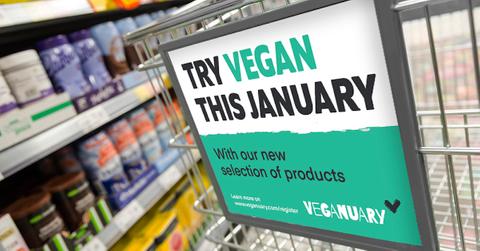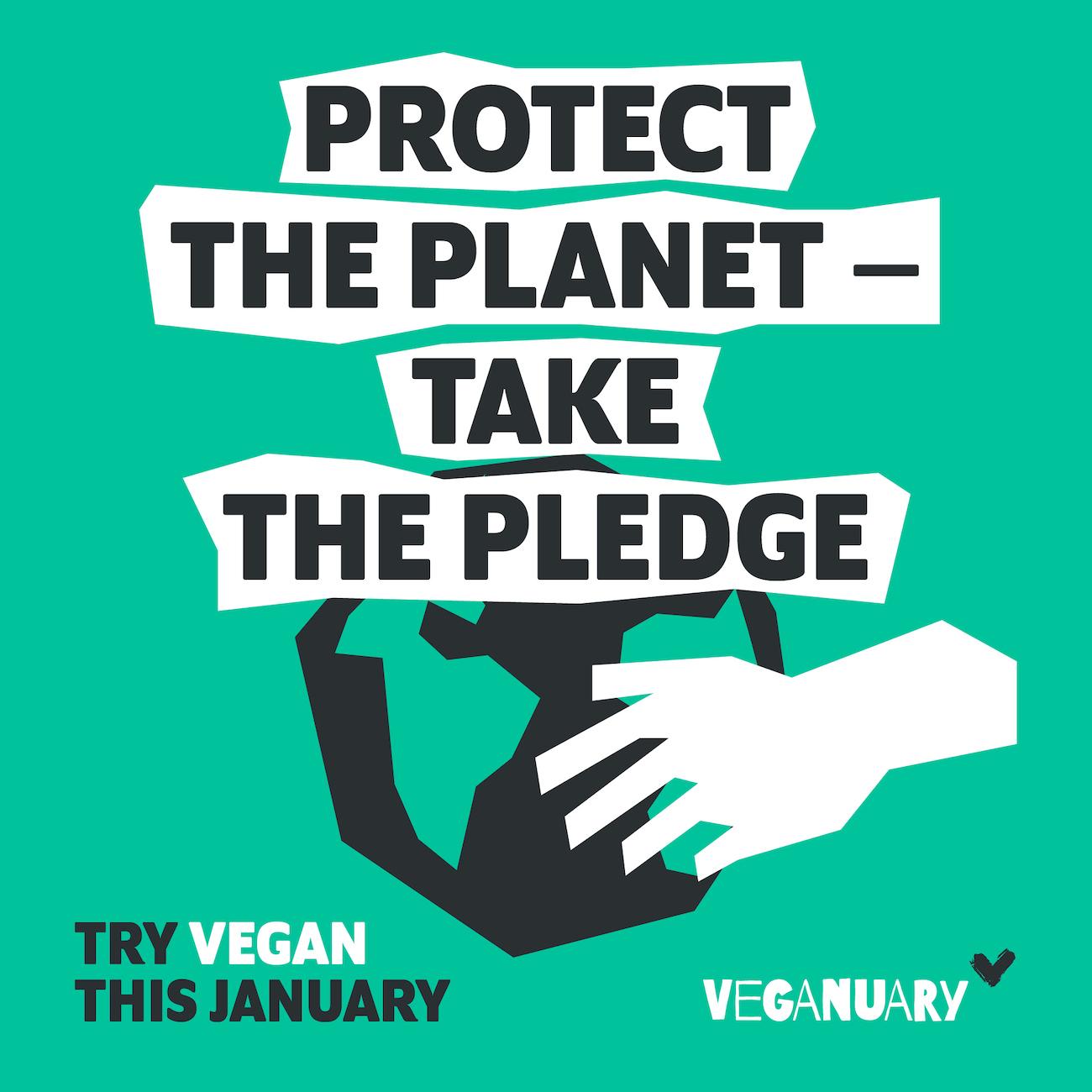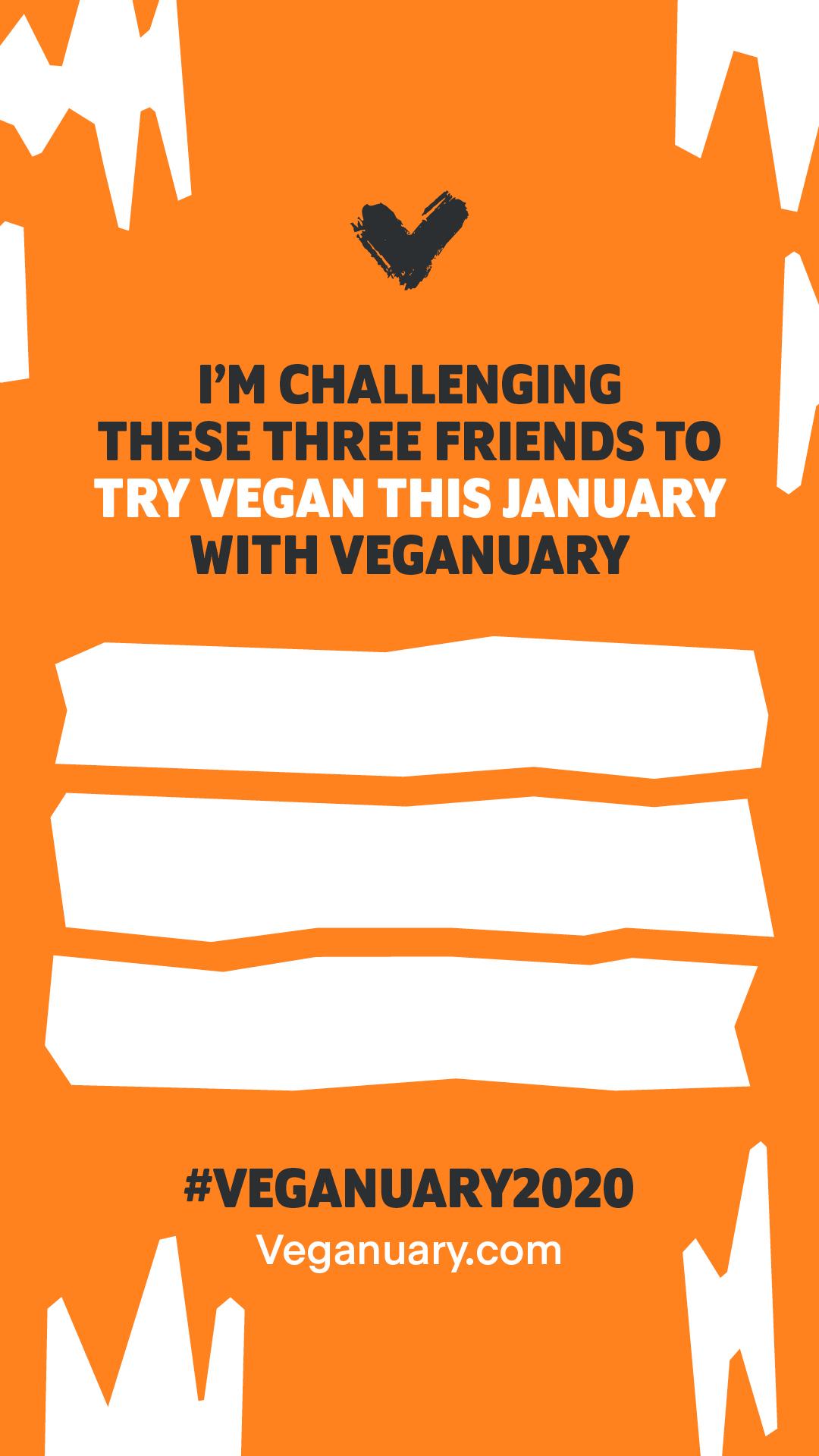Why Veganuary Is the Perfect New Year’s Resolution for Reducing Your Impact in 2020
Veganuary director Wendy Matthews shares her best tips for eating vegan for 31 days with Green Matters.
Updated Dec. 23 2020, 10:19 a.m. ET

With the climate crisis accelerating at the fastest rate we've ever seen and with vegan options at the top of their game, there’s no time like the present to try living a vegan lifestyle. Eating plant-based has a significantly lower environmental impact than any other diet, including a vegetarian, pescatarian, or meat-eating diet; veganism is the kindest diet for animals; and a diet rich in plants is generally healthier than one filled with animal products.
A great way to dip your toes into the vegan lifestyle is by participating in Veganuary for the month of January. Veganuary is a registered charity that encourages people to sign the Veganuary pledge to follow a vegan diet for 31 days. Most people sign the pledge for the month of January (it’s the perfect New Year’s resolution), though you can sign up for it any time of year. After signing the pledge, Veganuary will send you structured daily emails for 31 days with recipes, meal plans, tips, information about the impact of veganism, and more.
For the month of January 2020, Veganuary has a goal of garnering 350,000 participants worldwide. The total number of Veganuary participants goes up every year — and interestingly, so does the number of people signing up for environmental reasons. According to data Veganuary shared with Green Matters, 17 percent of people who signed up for Veganuary 2020 so far have cited the environment as their motivation for participating, compared to last year’s total of 12 percent.
To learn more about why 2020 is the perfect year to participate in Veganuary, we interviewed Wendy Matthews, the U.S. Director of Veganuary. Over the phone, Matthews explained to Green Matters how participating in Veganuary can lower your environmental impact, how to get started (hint: veganize your favorite meals), and why perfection isn’t everything.

The following interview has been edited for clarity.
GREEN MATTERS: More people than ever are citing environmental reasons as their inspiration for participating in Veganuary this year. Why do you think that is?
WENDY MATTHEWS: More people are connecting the dots between diet and health. And not just personal health, but also the health of the planet. And research shows that animal agriculture is the leading contributor of climate change and greenhouse gases, and it creates deforestation and species loss. Oxford University researchers recently stated that the single biggest thing anyone can do to help the planet is to go vegan. So I think part of the reason is that more information about the environmental impact of animal products is becoming available, and it’s also a major focus of our campaign this year.
GM: Why is participating in Veganuary a positive choice for the planet?
WM: 83 percent of farmland is currently used for animal agriculture — that’s either grazing for farm animals, or growing food to feed them. That gives [humans] only 18 percent of our calories. (Poore, 2018.) So it’s a highly inefficient way to produce food. And habitats like rainforests are destroyed due to the huge land requirement for animal farming.
So if everyone ate a plant-based diet, natural habitats could be protected and even restored. This is a global crisis that threatens every species on our planet, which is why Veganuary is urging people to try vegan in January and for the rest of the year.
Of course, we won’t save the planet in 31 days, but with 350,000 people expected to go vegan for the month, we will save tens of thousands of CO2 emissions, and of course countless animal lives.
GM: How much do you estimate 2020’s Veganuary participants can reduce their environmental impact by eating vegan for the month of January?
To answer this question, Matthews emailed Green Matters data compiled for Veganuary by Joseph Poore at the University of Oxford. Poore is known for his June 2018 study that concluded that eating a vegan diet is the best way to reduce our individual environmental impacts. He told Veganuary:
If 350,000 people worldwide do Veganuary for January it will save:
GM: What is one of the most common reasons people struggle to stick to a vegan diet during Veganuary, and how can participants avoid falling into that trap?
WM: I would give two pieces of advice. First, don’t think of it as an all or nothing commitment. Changing our entire diet can be difficult, and it’s likely that people will have slip ups or make mistakes. But it’s important not to use this as a reason to give up completely and go back to old eating habits. I would encourage people to do their best every day, cut themselves some slack when they’re not perfect, and trust that it will get easier.
And second, I recommend that people start by veganizing familiar dishes rather than exploring whole new types of cuisine. Meatless crumbles can be used for lasagna, bolognese, chili, or tacos. Plant milks can be used in mashed potatoes, sauces, and soups. And vegan sausages, burgers, and nuggets all make really easy swaps for meat-based products. These are easy changes and for the most part you can’t tell the difference.
GM: What is your best advice for people who want to take the pledge but have no idea where to start?
WM: Support is key to success. My recommendation would be to start by signing up for the Veganuary pledge so that you’re receiving emails with tips and recipes and support every day of the month. Join our Veganuary Facebook group, where you’ll find a really nonjudgmental welcoming community that can help with questions from, ‘What’s the best type of vegan cheese for pizza?’ to how to deal with social situations.
GM: What are the most common reasons people hold themselves back from trying Veganuary, and why do you think they should still try it?
WM: One of the most common reasons I hear for people not trying vegan is the fear they’re going to feel deprived. But that’s certainly not the case. I’ve been vegan for nearly a decade, and now more than ever, it’s so easy to find vegan cookies and cakes and pizzas, and I love that it’s so easy to access these types of foods on a vegan diet.
The variety and availability of vegan convenience food has increased dramatically in recent years. That’s really helpful for people who are new to vegan food and just starting to change their diet. Of course you don’t want to rely too heavily on processed foods, but really anything that you think you’re going to miss on a vegan diet, whether it be cheese or bacon or burgers, you can easily find a plant-based version.
GM: What is the best way for people to spread the word about Veganuary?
WM: Posting about Veganuary on social media with a sign-up link is a great way to get friends to participate, but I also think New Year’s is a really good time to challenge people to try new things, and directly calling out and challenging a friend to join you is a really great way to motivate them. Everything’s more fun with a friend. The fact that it’s a finite amount of time to start with — vegan for 31 days — makes it a little bit more approachable for people.
A lot of people ask us what happens after 31 days, and we certainly hope that people will choose to stay vegan after January, because it really is the best thing each of us can do to fight climate chaos and spare animals from suffering. But Veganuary exists to help people discover delicious plant-based foods and realize how easy it is to incorporate them into their lives, whether they choose to stay vegan for good or are just inspired to reduce their consumption of animal products. But our data shows people do stick with it. Following their Veganuary experience, 47 percent of respondents surveyed said they were committed to staying vegan.

Post this graphic to your Instagram story, and challenge three friends to join you in trying Veganuary.
How to Do Veganuary
To sign the Veganuary pledge, visit veganuary.com/register. After signing the pledge, you will receive a welcome email with a link to join the Veganuary Facebook group, and a link to download Veganuary’s celebrity cookbook, Matthews tells Green Matters. This year, an impressive roster of vegan celebrities are serving as Veganuary Ambassadors, including Joaquin Phoenix, Alicia Silverstone, Mayim Bialik, Daniella Monet, and Evanna Lynch.
Any questions you have about Veganuary or about the vegan lifestyle can be answered by searching on Veganuary’s website or by asking in the Veganuary Facebook group. As a starting point, you can check out Green Matters’ guide on transitioning to a vegan diet, as well as our guides to the best vegan meats, vegan cheeses, and the most eco-friendly non-dairy milks.
One of the most important questions you can ask yourself during Veganuary is: What is my motivation? If you can clearly define your “why,” eating plant-based for 31 days should be a piece of (vegan) cake. A great way to clarify your motivation is by watching documentaries, such as The Game Changers, Dominion, Forks Over Knives, Earthlings, What the Health, Eating Animals, and Cowspiracy.
Benefits of Veganuary
On top of reducing your environmental impact and saving animals, while doing Veganuary, you may also notice positive changes for your body and health. On a vegan diet, many people report improved digestion, clearer skin, weight loss, and more balanced energy levels in the short term. In the long term, you will reduce your chances of developing serious diseases including diabetes, pre-diabetes, high blood pressure, high cholesterol, obesity, heart disease, and certain cancers. And on top of all that, going vegan can facilitate a peace of mind, knowing that you are not hurting any animals.
Vegan Recipes and Meal Plans for Veganuary
For some meal inspiration, check out our lists of awesome vegan cookbooks and vegan YouTubers with easy plant-based recipes; Veganuary’s website is also filled with yummy vegan recipes, guides for eating out, and more.